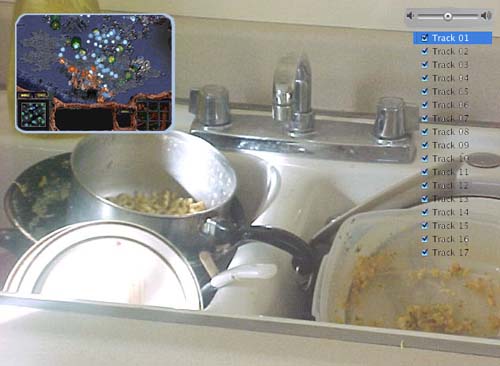
|
Lorna Mills and Sally McKay
Digital Media Tree this blog's archive OVVLvverk Lorna Mills: Artworks / Persona Volare / contact Sally McKay: GIFS / cv and contact |
View current page
...more recent posts

cyborg notes
I read in Edge* that Eye-Toy is working on an interface that will read facial expressions. Remember in the old days when AI advancements used to pose questions for ethical and philosophical debate?
Speaking of play, how about a tiny game that you ingest - taken in capsule form. A nanotech neurotransmitter that just stimulates the relevant brain bits. You can have it running in the background and turn your attention on and off of it at will. Come to think of it, the searchable i-tunes implant database will be pretty nice too. Volume control inside your head. Ears are just for wetware interface and avoiding physical impacts. I'm also waiting for the small muscle mod chip from Social Science™ that allows you to select and implement a variety of facial expressions so you don't have to leave your carapace gawping and drooling while you tend to important internal matters.
*sorry I can't find the quote online - read it in hard copy and then lent it to my friend

The pictures above are from Toronto's Alex Wilson Community Garden. Alex Wilson wrote a great, influential book called The Culture of Nature. When he died, this garden was made in his memory. It's right on the best graffitti alley in Toronto, which also happens to be my off-road route to work. Will post the occasional spring picture of this garden and alley because A: it's a beautiful thing, and B: there's another, very much alive, Alex Wilson on Digital Media Tree who spends a great deal of his time birdwatching in Central Park, one of the most cultured pieces of nature on the planet.
"We must build landscapes that heal, connect and empower, that make intelligible our relations with each other and the natural world: places that welcome and enclose, whose breaks and edges are never without meaning. We urgently need people living on the land, caring for it, working out an idea that includes human life and human livelihood. All of that calls for a new culture of nature, and it cannot come soon enough." Alex Wilson, 1953-1993
As I am currently fussing about USA, I have found recent posts over at michelle kasprzak blog quite stimulating. Nice history of passports and also this "says-it -all" quote, both from MK:
"It is interesting, the idea of moving to a place being equated with approval of what that nation stands for. It does seem like a vote of some kind. I know a lot of Canadians in America that worry about these things, and the reflection their choices make on them. Sometimes opportunities are too good to pass up, wherever they are located. My cousin is currently working as an airline pilot in the United Arab Emirates. Does he support their goverment? I'm not sure, but I do know he was offered considerably more money to fly for an airline based there than he was making here, so he went. We tend to ask these questions a lot more when someone settles in America, which I think is a good examination of conscience, but a move sometimes simply means an opportunity for change, money, personal growth, or any combination of these things. Where one chooses to settle, either temporarily or permanently, can sometimes be quite arbitrary. A generation or two ago, some Eastern European immigrants had to choose between places they didn't know very well - Australia and Canada, in one story that I remember. I think Canada was chosen because it seemed not so far away from Europe, and yet offering a blank slate. Not a compelling "vote" in favour of Canada, it's true. But interesting to think about the misperceptions, fantasies, and other reasons for choosing a place to immigrate to - the American dream being the strongest example I can think of.I take MK's point, but at the same time I can't help but worry about when to draw the line...when is another country's foreign (or domestic) policy soooo bad, that to even be associated by geography is to be too complicit?

|
Castle in the Sky is the film that I could not watch due to a parental block on my Playstation. Arg!!! Well fine, now I got other means to watch whatever I want ... so I'm allowed see kid's movies like this one, co-produced in USA by Disney, ironic. Anyhow, my stupid tech woes aside, this is another really lovely anime [via] by Hiyao Miyazaki (Princess Mononoke, Spirited Away). The story is a bit weak compared to his others, written for a younger audience maybe, but the artwork is unbelievable. Miyazaki has a knack for nature, and the grasses, trees and clouds in this film are simply stunning. The tale revolves around Laputa, a floating city in the sky that has been long abandoned and overrun with plants and trees. Huge, soft spoken robots are the only surviving inhabitants and they wander about the place growing moss and taking care of birds' nests. This is the most poignant and gripping aspect of the movie. I got a bit bored with the rest of the plot, but honestly I've never seen such a good-looking movie, so I dozed and let the pretty pictures transport me. |
Kiss Machine in the Toronto Star: "With agriculture, when you get down to only a few species, people get sick," [Emily Pohl Weary] says. "It's the same thing with cultural creations. You don't want any one or five big magazines to rule the world."
A recent thread elsewhere directed me to this excellent, informative essay by Mr. Wilson on the historic relationships between art and Central Park.
"Throughout its history there has been a dialectic between an “elitist” and a “populist” concept of the Park. It was conceived by cultured (and wealthy) people who wanted a park to match the great public places of Europe, and also to increase the value of real estate uptown. Theirs was a Romantic view of Nature, by way of American Transcendentalism. The Park would be for quiet contemplation and relaxation. The lower classes, in so far as they had access, would be edified by the models both of Nature and of their social betters."In case there are any readers of this page who are unaware of the rest of Digital Media Tree, it is full of great, smart writing. Browse around.